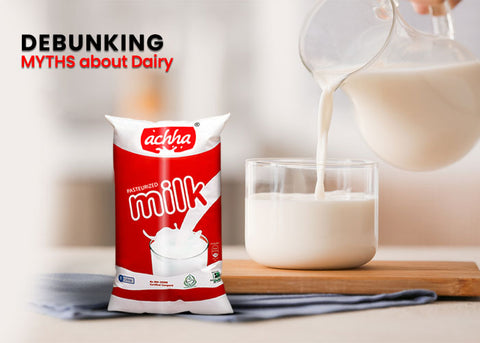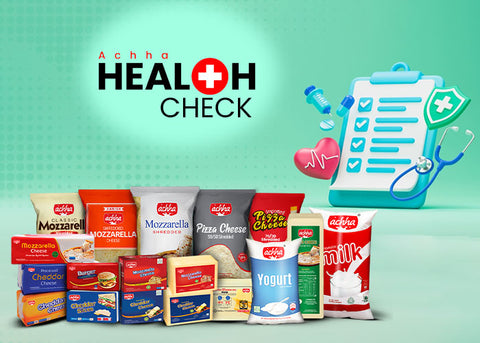Dairy products have been a dietary staple for centuries, valued for their nutritional richness and versatility in culinary creations. However, over time, various myths and misunderstandings have emerged regarding the health effects of consuming dairy. In this blog, we'll separate fact from fiction and delve into the science behind dairy's role in a balanced diet. Achha Foods addresses several common dairy consumption myths, providing evidence-based information to help readers make informed decisions about incorporating dairy into their diets.
Myth #1: Dairy Is Bad for Bone Health
One of the most rumored myths surrounding dairy is that it harms bone health due to its acidity or alleged leaking of calcium from bones. However, scientific evidence supports the opposite view. Dairy products like Achha Mozzarella Cheese, Achha Cheddar Cheese, Achha Milk, Achha Yogurt, and Achha Butter are rich in calcium, a crucial mineral for bone strength and density. Calcium absorption from dairy is highly efficient, thanks to its optimal calcium-to-phosphorus ratio and the presence of vitamin D, which enhances calcium absorption.
Studies have consistently shown that individuals who consume adequate amounts of dairy or calcium-rich foods are more likely to have stronger bones and a reduced risk of osteoporosis and fractures, especially in older age. It's important to note that dairy products like Achha Mozzarella Cheese, Achha Cheddar Cheese, Achha Milk, Achha Yogurt, and Achha Butter are just one source of calcium, and other foods like leafy greens, fortified products, and calcium supplements can also contribute to meeting daily calcium needs.
Myth #2: Dairy Causes Weight Gain and Is Unhealthy
Another misconception is that dairy consumption leads to weight gain and is inherently unhealthy due to its fat content. While it's true that some dairy products are high in saturated fats, which should be consumed in moderation, dairy itself is not a primary contributor to weight gain or poor health.
In reality, dairy products like Achha Mozzarella Cheese, Achha Cheddar Cheese, Achha Milk, Achha Yogurt, and Achha Butter can be part of a healthy diet when chosen wisely and consumed in appropriate portions. Research indicates that dairy's protein content can promote satiety and contribute to weight management efforts. Moreover, dairy products like Achha Mozzarella Cheese, Achha Cheddar Cheese, Achha Milk, Achha Yogurt, and Achha Butter offer a range of essential nutrients like protein, calcium, vitamin D, vitamin B12, and potassium, which are beneficial for overall health.
For individuals concerned about saturated fats, opting for low-fat or fat-free dairy options can provide the nutritional benefits of dairy without the excess fat content. Incorporating Achha Dairy into a balanced diet alongside fruits, vegetables, whole grains, and lean proteins can support optimal health without causing weight-related issues.
Myth #3: Dairy Is Not Suitable for Lactose Intolerant Individuals
Lactose intolerance is a common condition characterized by the inability to digest lactose, the sugar in milk and dairy products. While individuals with lactose intolerance may experience digestive discomforts such as bloating, gas, or diarrhea after consuming dairy, this doesn't mean they need to eliminate it.
Many lactose-intolerant individuals can still enjoy dairy products by choosing lactose-free options or those with reduced lactose content. Lactose-free milk, yogurt, and cheese are widely available and provide the same nutritional benefits as regular dairy without causing digestive issues. Additionally, fermented dairy products like yogurt and aged cheeses are often better tolerated due to lower lactose levels.
Moreover, lactase enzyme supplements are available over-the-counter and can help break down lactose for individuals with mild to moderate lactose intolerance. Those with lactose intolerance need to experiment with different dairy products and find what works best for their digestive comfort while reaping dairy's nutritional advantages.
Myth #4: Dairy Contributes to Skin Problems
Some people believe that dairy consumption exacerbates skin issues like acne or eczema. While individual responses to dairy can vary, scientific studies have not established a direct causal link between dairy consumption and skin problems in the general population.
In fact, dairy products like Achha Mozzarella Cheese, Achha Cheddar Cheese, Achha Milk, Achha Yogurt, and Achha Butter contain nutrients like vitamin A, vitamin E, and zinc, which are beneficial for skin health. Some studies suggest that specific dairy components, such as whey protein and bioactive peptides, may have anti-inflammatory and antioxidant properties that could benefit skin conditions.
It's important to note that if someone suspects that dairy worsens their skin condition, they should consult a healthcare professional for personalized advice. Eliminating dairy without proper guidance may lead to nutritional deficiencies or unintended health consequences.
Myth #5: Plant-Based Alternatives Are Superior to Dairy
With the rise of plant-based diets and dairy alternatives, another myth claims that plant-based milk or cheeses are inherently healthier than traditional dairy products. While plant-based options can be suitable for individuals with dietary preferences, allergies, or ethical considerations, they are not automatically superior in nutritional value.
Many plant-based milks are fortified with vitamins and minerals to mimic the nutritional profile of dairy milk, but they may lack certain nutrients naturally found in dairy, such as complete proteins and specific vitamins like B12. Consumers must read labels and choose fortified plant-based products to ensure adequate nutrient intake.
Moreover, the environmental impact of dairy alternatives versus dairy products is a complex issue involving water usage, land use, greenhouse gas emissions, and overall sustainability. Depending on production practices and sourcing methods, dairy and plant-based options can be part of sustainable food systems.
Facts and Recommendations for Dairy Consumption
After dismantling these common myths that surround dairy, it's essential to provide evidence-based facts and recommendations regarding its consumption:
Vitality:
Dairy products like Achha Mozzarella Cheese, Achha Cheddar Cheese, Achha Milk, Achha Yogurt, and Achha Butter are rich in calcium, protein, vitamins (such as vitamin D and B12), and minerals that are vital for bone health, muscle function, immune support, and overall well-being.
Choose wisely:
Opt for low-fat or fat-free dairy options to reduce saturated fat intake while benefiting from dairy's nutritional content. Include various dairy products such as Achha Mozzarella Cheese, Achha Cheddar Cheese, Achha Milk, Achha Yogurt, and Achha Butter or fortified alternatives.
Individual needs:
Individuals with lactose intolerance can still enjoy dairy by choosing lactose-free options or using lactase enzyme supplements. Consult with a healthcare professional or registered dietitian for personalized guidance.
The Balance key:
Incorporate dairy into a balanced diet that includes a variety of nutrient-dense foods such as fruits, vegetables, whole grains, lean proteins, and healthy fats.
Moderation:
Like any food group, moderation is key. Enjoy Achha Mozzarella Cheese, Achha Cheddar Cheese, Achha Milk, Achha Yogurt, and Achha Butter in appropriate portions as part of a diverse and well-rounded eating pattern.
In conclusion, debunking dairy health myths requires understanding the scientific evidence and separating misconceptions from facts. Achha Foods dairy products can be a valuable and nutritious component of a healthy diet when consumed mindfully and in line with individual dietary needs and preferences. By dispelling myths and promoting accurate information, Achha Foods aims to empower individuals to make informed choices about their nutritional habits and overall wellness.



